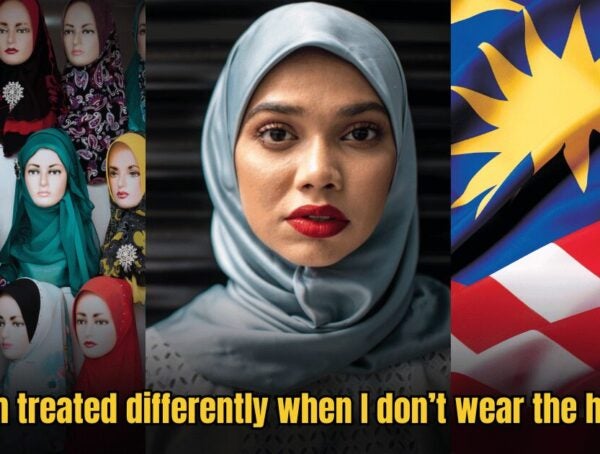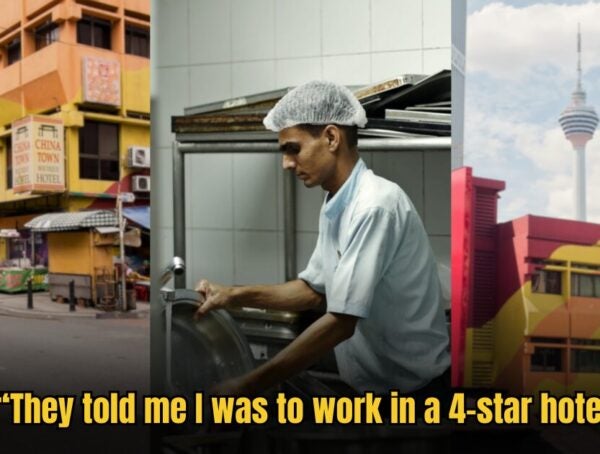“Where are you from?” No words ever scared me more than these. For most people they can answer that in one word. For people like me, it’s a paragraph.
“Do you mean my passport country? Or where I grew up as a child, or teenager? Or where my parents are at now (Sudan) or where I am living currently? I was born in Dhaka, Bangladesh, but I am Malaysian as both my parents are from there. I ‘visited’ Malaysia when I was one-year old, after which I moved to live in Brazil where I received my primary school. There, I learned to speak my first languages: Portuguese and English. Malay was just spoken at home. I only spent four years of my childhood in Malaysia before moving again as a teenager to Kosovo, and had to learn German for two years.“
At eighteen, I finally got back ‘home’. But I will always have that Brazilian, Kosovar and Namibian culture fused to my personal culture, travelling through 30 countries and 4 continents before I was 21.
Call us ‘global nomads’, ‘third culture kids’ or in my case, a ‘diplobrat;, what defines us all is a childhood spent growing up outside of our own country. Diplobrats might seem like a derogatory term but it is generally used to describe children of diplomats and other personnel who serve in diplomatic missions outside of their own country.
Other ‘global nomads’ includes those whose parents work for oil companies, missionaries, and military. They are all better known as ‘Third Culture Kids’ (TCKs). According to American sociologist David C. Pollock, “A Third Culture Kid (TCK) is a person who has spent a significant part of [their] developmental years outside of the parents’ culture.”
“The TCK frequently builds relationships to all of the cultures, while not having full ownership in any. Although elements from each culture may be assimilated into the TCK’s life experience, the sense of belonging is in relationship to others of similar background.”
An educational edge over traditional schooling
While many people who have spent their entire lives in one country might not have a frame of reference for international issues, ‘third culture kids’ like us can easily relate which can translate meaningfully to our work and relationships later in life, as society, businesses and governments become more globally connected.
“Statistics display that TCK’s are inclined to be better educated, attain advanced educational qualifications, have lower divorce rates, adapt well to other cultures, and are more open-hearted to people from different cultures. Besides the statistics, talking to a TCK can be a rewarding experience as they have unique perspectives on world events, politics and can often talk far more intelligently than their mono-cultural counterparts about a whole range of topics,” according to Brian Brewster, Head of Dalat International School (DIS).
The term ‘third culture kids’ is attributed to Dr. Ruth Hill Useem, a professor at the Michigan State University Institute for International Studies, who had researched extensively on this area in the 1990s.
She had coined the term to describe children who’s culture growing up is a collage of many international experiences and her findings also support Brian’s observation above that suggest TCKs are more likely to excel academically.
“Exposure to different beliefs and learning systems, becoming commonplace to be around people with different perspectives, and growing up being aware of the diversity of people and information brings about a rich experience,” quips Scott Muir, High School Counsellor for the International School of Kuala Lumpur (ISKL). “They are ready to accept different styles of education and teaching methods as they have gotten used to changing schools,” he observed.
Lily At Morocco“Humanity is diverse. That there’s not one idea of right and wrong” – Lily Jamaluddin, diplobrat
As a self-described peripatetic, Lily Jamaluddin is the daughter of a Malaysian diplomat, and has grown up in Australia, Thailand, Romania and United States as “someone whose life experiences are influenced by moving around a lot and being geographically displaced”.
“I’m proud to have had the chance to live and grow abroad, where you are constantly being challenged and pushed out of your comfort zone and need to constantly adapt; it’s an important life skill that we all have to learn…Your ideas of truth and religion and morality are lived differently by people in different places “, Lily shared with Malaysian Digest.
Zaffran, 19, has lived in Switzerland, Fiji, Kenya, and Canada. “I realize that I am more accepting, have a wider view of the world, not that judgmental of people, and am glad I got to experience the world and seen stuff that most people haven’t seen…like I could compare the standards of living between Kenya and Canada”.

Zaffran at Canada, ” “I realize that I am more accepting, have a wider view of the world, not that judgmental of people..”
Other perks include being able to travel a lot, experience snow, desert and jungles, dating people from other nationalities, eating different foods such as goulash, pomfrit, pop kek, flija, pao de keju, baklava, zebra steak, kudu and game meat to name a few, and having a diplomatic passport that gives you access to the diplomatic lane at the airports.
To most foreign people who do not travel abroad, we (diplobrats) are the only people from Malaysia they will ever know and see. I remember walking downtown in Pristina, Kosovo, to go shopping when a group of kids, began making ‘kung fu’ sounds and making Bruce Lee poses – they thought I was Chinese despite my brown complexion (must have been the eyes).
As mini-ambassadors, I also felt as my responsibility to project a positive image of Malaysia, and correct misinformation such as the location of Malaysia:
“Oh right. Isn’t it like at North Africa?”, “Malaysia? Hmm you look Chinese but you are brown. I don’t know”. “Wait, is it between China and India?” and “Sorry but I don’t know much about Malaysia (it’s beautiful!). It isn’t as famous as Singapore though”.
Coming back to the ‘passport’ country – an education in itself
Coming back to their ‘passport countries’ can be a traumatic experience for TCKs as having to move from time to time displaces a child’s sense of belonging, according to research by Sheppard and Steele of the National Institute of Trauma and Loss for Children.

Diplobrats (and the whole family) receive diplomatic passports for travelling overseas. Notice how the passport is valid for all countries (Israel is not printed).
“[The] sense of being disconnected and feeling like a stranger with the home and host country, and for most people they would drift back to school (college) in their own home countries” mentions Scott Muir, who also experienced a ‘reverse culture shock as an adult TCK’, after having lived in Malaysia for 16 years.
“But once you move to a new country, you will feel excited as everything is new, then you realize you will miss things that are not as easy to get by like before, but eventually you will figure it out”, he advised.
“The [other] challenge comes when they are faced with adapting to people who have not had the exposure to other cultures that they have. For example, they may have grandparents who don’t understand why their grandchild does not show respect in a way that they feel is proper (the kid may not know what is proper),” Brian pointed out as an example.
“It may be as simple as the frustration that they feel talking to people who don’t care about anything outside of their small town when the Third Culture Kids has such a broad perspective. Or it may be as big as a lifelong feeling that they just don’t really fit in well with any particular culture group,” says Brian, himself a TCK who believes that the positives must not be overlooked.
Lily on the other hand finds that there’s so much novelty in Malaysia and “can envision a permanency and a network that will last here in Malaysia. I could explore religion, my heritage and I could explore race in this completely different land and a history that is related to my history. It was all about finding meaning and building a home here”, she shared with Malaysian Digest.
Many Malaysian ‘diplobrat’ youths also feel like a ‘hidden immigrant’. While looking just like any other citizen, inside they feel different from the rest.
“I don’t think I fit like a Malay…there’s cultural and communication barriers everywhere I go, and after a year I am still trying to adapt here in Malaysia. Mostly it’s because my Bahasa Melayu language is terrible”, says Zaffran.
“I also felt uncomfortable when people ask me – are you Malay, Chinese, Indian? Because the idea of race here is so fixed, when in reality it’s constantly in flux as a social construction. It’s important to know that our identity is not defined by our nationality. Our identity is comprised of stories that we have. ” declares Lily.
Invaluable life experiences: Education beyond the classroom

By and large, people use the term “diplobrat” to disdainfully speak of diplomats’ children, in the impression that we lead lavish and cosmopolitan lifestyles. While some of us have had the chance of joining high-class dinner receptions, met with foreign leaders and diplomats, and schooled with other children from influential families, it’s not all that dazzling.
When you are growing up, insecurities and immaturity can amplify that feeling of constantly being an outsider. What do the other students wear? Where do they hang out in their free time? How do I fit in? As a TCK, these questions are repeated at every new country they settle in and call home for another undetermined period of our life.
In retrospect, while it was difficult to pack your bags, leave your friends and move to a new country, home and school several times, I believe many diplobrats and TCK’s cherish a unique and global upbringing. Maybe one day eventually, ‘where are you from’ can be answered with a choice of where we do choose to belong to.
A video entitled ‘Third Culture Kids’ which has received over 59,000 views best summarizes the ethos of growing up as a ‘global nomad’. Featuring interviews with TCKs worldwide, it amplifies the invaluable education experience these TCKs derived from their mobile upbringing.
Take a look at the video below:
Know anyone with an interesting story to share? Drop us an email at hello@inreallife.my and we may feature the story!
For more stories like this, read:
You might also like
More from Real People
‘A RM100 fee cost a company 5 years of revenue’ shares M’sian
This story is about a Malaysian who learned that bureaucracy can be defeated simply by not arguing with it.A billing …
‘I quiet-quit, upskilled, and tripled my salary,’ shares M’sian engineer
This story is about a Malaysian who learned that loyalty without leverage leads nowhere in the corporate world.After years of …
‘I did everything right, and it still wasn’t enough’ shares M’sian graduate
This story is about a Malaysian graduate navigating big dreams in a job market where a degree no longer guarantees …


















